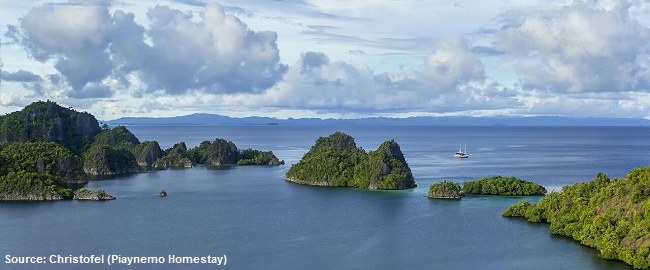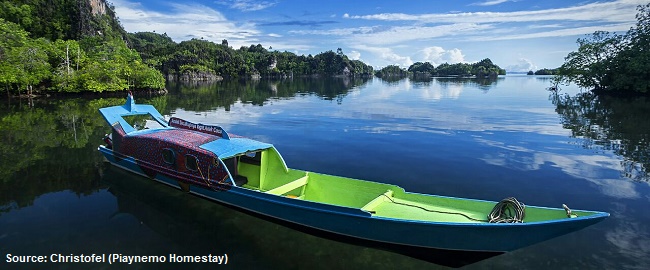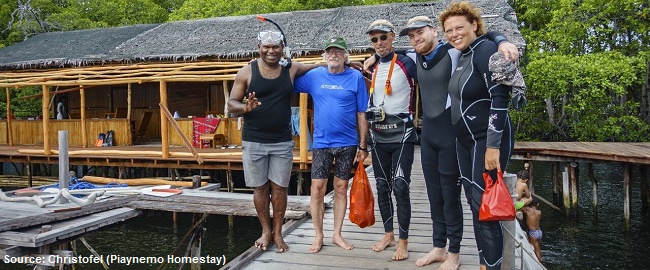Tourist Destinations in Indonesia: Piaynemo Homestay in Raja Ampat
Elly Dimara never thought that he would be interested to open an inn named Piaynemo Homestay. Well, until five years ago. "I saw the great tourism potential of Raja Ampat. Moreover, I realized that I have a great plot of land that I can develop into a tourist attraction", Elly said.
Armed with savings he acquired over decades working in several oil refineries, Elly and his family built the Piaynemo Homestay on the land he had inherited. Building environmentally friendly homestays (eco property) is mandatory in the area of Raja Ampat. That is how Piaynemo Homestay - made of wood boards and leaves - was constructed at the edge of Piaynemo island, facing the open sea.
Elly informed that the majority of guests visiting his homestay are divers. This is because one of the most favorite spots for divers - namely Melissa's Garden - is located near his homestay. But the beauty of Raja Ampat is too abundant to be overlooked by other lovers of natural scenery. No wonder the majority of visitors at Elly's homestay are foreign tourists and travelers rather than local ones.

However, Piaynemo Homestay is not only open to those who spent the night and/or seek to dive in the area. "Part of the boats that sometimes stop over at out homestay just want to enjoy lunch or take a rest here," Elly said. As can be predicted, the main menu served at this inn consists of seafood - fresh fish grilled or fried, as well as cod in turmeric sauce (ikan kuah kuning), a local specialty in Papua. Frequently Elly allows his guests to bring the seafood they just caught at sea and cook it at the inn. This creates the family atmosphere at the homestay, which is the key factor for guests to feel at home and enjoy their holiday on the island.
To reach Piaynemo Homestay, visitors are picked up by speedboat at Waisai (the capital of Raja Ampat) and transported to the island of Piaynemo. Although this journey takes about two hours, visitors are guaranteed not to be bored during the trip because it offers beautiful views along several memorable spots such as Kabui, Arborek, Sawinggrai, Yenbuba, and Sand arises.

The natural beauty of Raja Ampat not only tempts local residents, like Elly, to open an inn. Currently, there are several homestays in Raja Ampat that are run by foreign people. Throughout his experience in this business, Elly met limited obstacles. "For local businessmen, the biggest obstacles are the costs and guidance of local personnel". The local population is, on average, low educated and therefore needs to be taught specific skills related to services and tourism (this is in stark contrast to human resources on Bali where the quality of workers in the tourism sector is generally high).
"On the other hand," Elly adds, "the greatest difficulty for foreigners to open a homestay in Raja Ampat is to obtain a license to use the land that is still divided through customary rights". That is why there is a common local proverb that goes like this: "kayu paling mahal di Raja Ampat adalah kayu palang (the most expensive type of wood in Raja Ampat is kayu palang)". This proverb stems from an experience that unfolded when a foreigner opened his business in Raja Ampat but he was reluctant to establish good relationships with the locals and, in fact, failed to get approval from the local residents to open his business. The local residents then took matters in their own hands and sealed the foreigner's homestay with kayu palang. In order to open his homestay again the foreigner had to become friends with the local people, which also included payments to the locals.

Fortunately, the biggest problem in Raja Ampat has basically been resolved, namely the price of fuel. It is already an old story that fuel prices in Raja Ampat are expensive (for Indonesian standards), reaching IDR 15,000 per liter (whereas the normal price on Java would be around IDR 6.450 per liter). The high cost of fuel prices also pushes up prices of most basic needs, because goods need to be distributed to the islands by boat. Every day, the boats that travel in the waters of Raja Ampat are using large quantities of fuel for the transportation of goods and people.
But the Indonesian government recently implemented a new policy under President Joko Widodo. Fuel prices across the archipelago - from Sabang to Merauke - should now be the same, currently at around IDR 6,500 per liter. This policy is called the one fuel price policy.

Regardless, Elly believes that every tourist who visits Raja Ampat will get new insights. Not only for the purpose of refreshing, but also to realize how wonderful the world is when man and nature come together in harmony. That is why there is a saying among local residents: "before you go to heaven above, first stop to heaven on earth: Raja Ampat".
For more information about Piaynemo Homestay, you can visit these websites www.piaynemo.com and www.stayrajaampat.com
This column was written by Lori Singer, journalist and producer at Indonesian television content provider Kompas TV. She has great interest in social matters and the cultural uniqueness of each location she visits, both domestically and abroad. Follow her blog: www.awalkinmyshoe.blogspot.co.id (Indonesian language)

